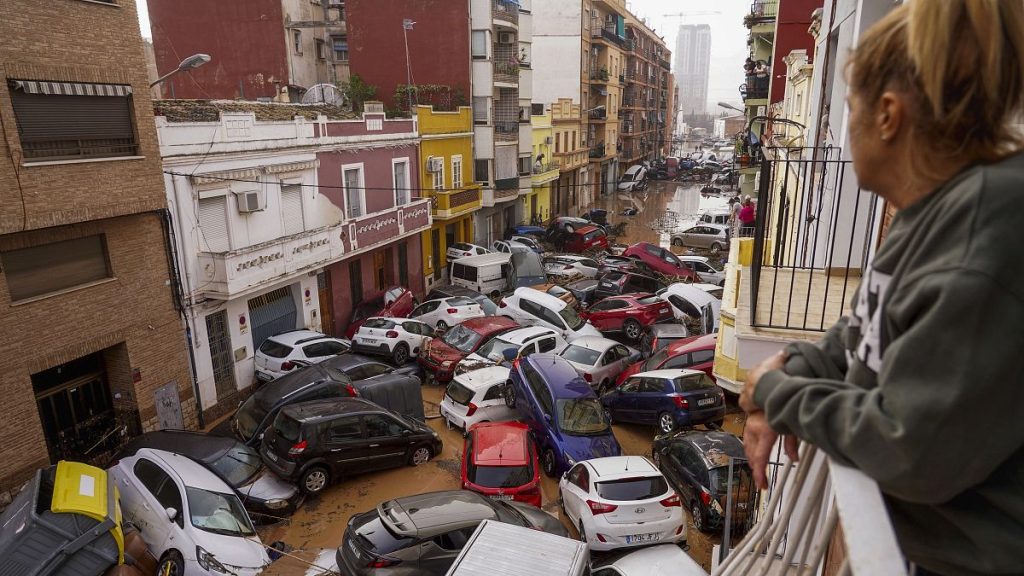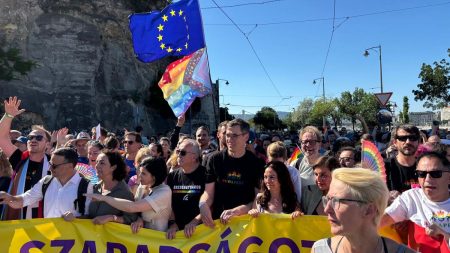In Valencia, Spain, tens of thousands of residents have taken to the streets in protest following devastating floods that struck the city a month earlier. The catastrophic event, attributed to Storm Dana, has been marked as Spain’s worst natural disaster in decades, resulting in over 230 fatalities. The protests, which saw around 130,000 participants, are aimed at regional officials, especially at Valencia’s regional president, Carlos Mazón, demanding his resignation due to the perceived inadequacy of the emergency response. This ongoing outcry reflects the escalating frustration of the populace, eager for accountability from their leaders after such profound loss of life and property.
Mazón, while acknowledging that errors were made during the emergency response, has deflected the blame by characterizing the floods as unprecedented and overwhelming, suggesting that the circumstances were beyond the capacity of his administration to manage. His claim points to the sheer volume of rainfall—equivalent to an entire year’s worth within just eight hours—as a critical factor in the disaster’s severity. Despite his reshuffling of the cabinet and assigning a retired general to oversee cleanup efforts, many residents remain unconvinced of his leadership and competency, intensifying calls for his removal from office. The discontent among residents is palpable, with sentiments expressed by protesters like Vicente Romero stressing that the ultimate responsibility lies with Mazón himself.
Describing the local government’s reaction as negligent and inept, the protestors are adamant about holding officials accountable for their perceived failures. The timeline of events revealed a critical lapse in communication—specifically, the administration did not issue mobile alerts to warn residents of the impending floods until after the disaster had already begun to unfold. This lack of timely information contributed to a chaotic situation where thousands of citizens found themselves trapped in their homes, oscillating between despair and frustration as help was delayed. The damage inflicted by the floods was monumental, leaving many homes and vehicles destroyed or severely damaged, creating a long-lasting impact on the community.
The fallout from the floods has left over 2,000 residents unable to return to their homes, and with approximately 155,000 people still lacking electricity, the need for a swift recovery has become increasingly urgent. Despite some roads being partially cleared, the remnants of disaster linger in the form of dust and debris scattered throughout the city. Recovery efforts are focused on the immediate restoration of services, particularly the sewage system, which has suffered from significant saturation and must be cleared to avoid long-term complications. The logistical challenge of this endeavor illustrates not only the scale of the destruction but also the city’s ongoing struggle to regain normalcy in the post-flood landscape.
As the community rallies in protest, their message is persistent: they will continue advocating for accountability until their leaders are held responsible for the lapses that led to the tragedy. It’s a powerful demonstration of collective will amid overwhelming adversity, as the citizens of Valencia strive for transparency and responsibility from their local government. The protests symbolize more than just anger toward the specific individuals in power; they represent a broader demand for improved disaster preparedness and responsiveness in the face of natural calamities. The sentiment among the populace underscores a multifaceted need for both emotional healing and practical solutions as they grapple with the aftermath of the flooding disaster.
In the weeks since the initial flood, Valencia stands at a crossroads, faced with the dual tasks of mourning its losses and demanding justice. The protest movements have highlighted systemic issues within local governance, drawing attention to the need for robust emergency protocols that can protect citizens in future crises. As residents continue to confront the immediate challenges of recovery, their resolve to seek accountability from their regional leaders showcases the critical intersection of civic engagement and governmental responsibility. The outcome of these protests may ultimately reshape the political landscape in Valencia, as the community insists on a future where preparedness is prioritized and accountability becomes a cornerstone of local governance.














